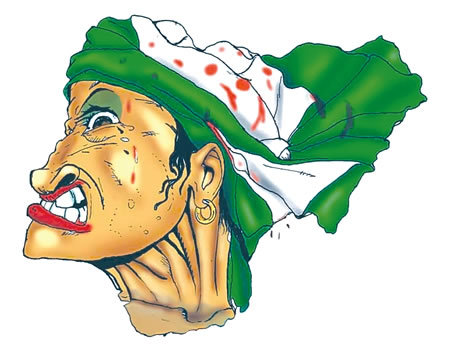
Not the Nigerian. We believe success derives from under-cutting and belittling people. “These northerners are backward and uneducated, the Chibok girls couldn’t speak basic English.” But on View Point, a Rhythm 93:7 FM Port Harcourt on Saturday talk show, I heard an interactant say,”Ogoni is a one community,” it was so fascinating as I heard another say, “who is the people?” These were southerners, not northern Nigerians.I know better than measuring the intelligence of people by how much they can speak the English language. Can the English man speak my language, the Igala language? What then makes English people better than us when they cannot speak our language? Despite our poor knowledge of the English language, we do not feel any obligation to honor commitments. When a director committed suicide in my state of Kogi for being owed a backlog of salaries as alleged, the Head of Service put out a statement quickly to the contrary and obliquely lampooned the dead. To owe people salaries is a novelty in this country and to pay them, a favour.
No one is permitted to squawk. I know of a company, where workers queue to thank the CEO after being paid their salaries at month-end. I can imagine them kneeling to do so, in my mind’s eye. Such is the country we live in. Those whose forte does not include allowing people to confine them to catacombs don’t last in such companies as bosses get standoffish around them. To embarrass people has quickly become a culture. Cash defines relationships. In earlier days before militancy destroyed this city, to work in an IOC was the be-all-and-end-all. “That man works in Halli,” which was the short form for Halliburton. All others had their acronyms. Staffers got attention, were feted and got the good girls. With militancy, staff members of IOCs aren’t as influential in the public eye as they once were. Their influence in this city today ends in their work place. Militants and oil bunkerers have more money than oil workers. Many militants have been installed as chiefs in their locale, some are state legislatures and move around with military escorts. The money they have made should serve them for the rest of their lives.
All other professionals outside militancy and politics are categorised as pen-pushers. We have jettisoned calm and modest lives which bring happiness for the pursuit of low-brow with constant restlessness. And so we are tolerated for writing pieces but won’t be tolerated if we attempt to contest electoral positions. People may be sent to beat the be-Jesus out of us, if they choose not to ‘Harry’ us, ‘Ige’ us, ‘Kaltho’ us and ‘Williams’ us. We are guilty of a serious lack of respect for men. All thanks to the love of possessions which increases worry. Most atheists and agnostics are happy people. They believe in humanity more and their success isn’t rooted in immodest lifestyles. Take Bill Gates and Warren Buffet for instance. They throw more money around for humanity than those who carry Holy Books. Gates and Buffet know the importance of money but also that the best way to be happy is not to have more money. They know that happiness is not realised by the buying of things that would give them pleasure and accumulate more and more possessions. Might it be that they stumbled on Benjamin Franklin’s wise words that, “He who multiplies riches multiplies tears.” No wonder there isn’t love in homes any longer because most people are chasing after money, even in the wind. No wonder people are on our streets daily begging for nickels to go and treat bad health.
No wonder some law enforcement agents take ‘bloody’ civilians to the ATM machines, due to small infractions, collect money, dubbed bail money, and tap them on their back after bellowing,”its nice doing business with you.” Real happiness comes from showing love without borders away from the love of materialism. When we die, all of our wealth doesn’t go with us. What keeps our memories alive are the good deeds we carried out for humanity. Humanity therefore take us to a gilded pantheon of immortality thanks to the influence we may have had on people and humanity, that outlive us. Just now a young lady at the suya stand asked a young man in Hausa, “Basakwache yana neman Bakano?” But for the Sultanate, why do folks from Kano look down on people from Sokoto? What’s wrong in a Sokoto man angling to date a Kano lady? Why is there a battle of superiority between the Oguta people in Imo State? Oguta 2 say they are the original Oguta 1. What value is there in grading a human pedigree based on place of birth? Maybe it’s time for us to consider the words of author, Emile Henry Gauvreay: “I was part of that strange race of people aptly described as spending their lives doing things they detest to make money they don’t want, to buy things they don’t need, to impress people they dislike.”
- Abah writes in from Port Harcourt, Rivers State
WATCH TOP VIDEOS FROM NIGERIAN TRIBUNE TV
- Let’s Talk About SELF-AWARENESS
- Is Your Confidence Mistaken for Pride? Let’s talk about it
- Is Etiquette About Perfection…Or Just Not Being Rude?
- Top Psychologist Reveal 3 Signs You’re Struggling With Imposter Syndrome
- Do You Pick Up Work-Related Calls at Midnight or Never? Let’s Talk About Boundaries





